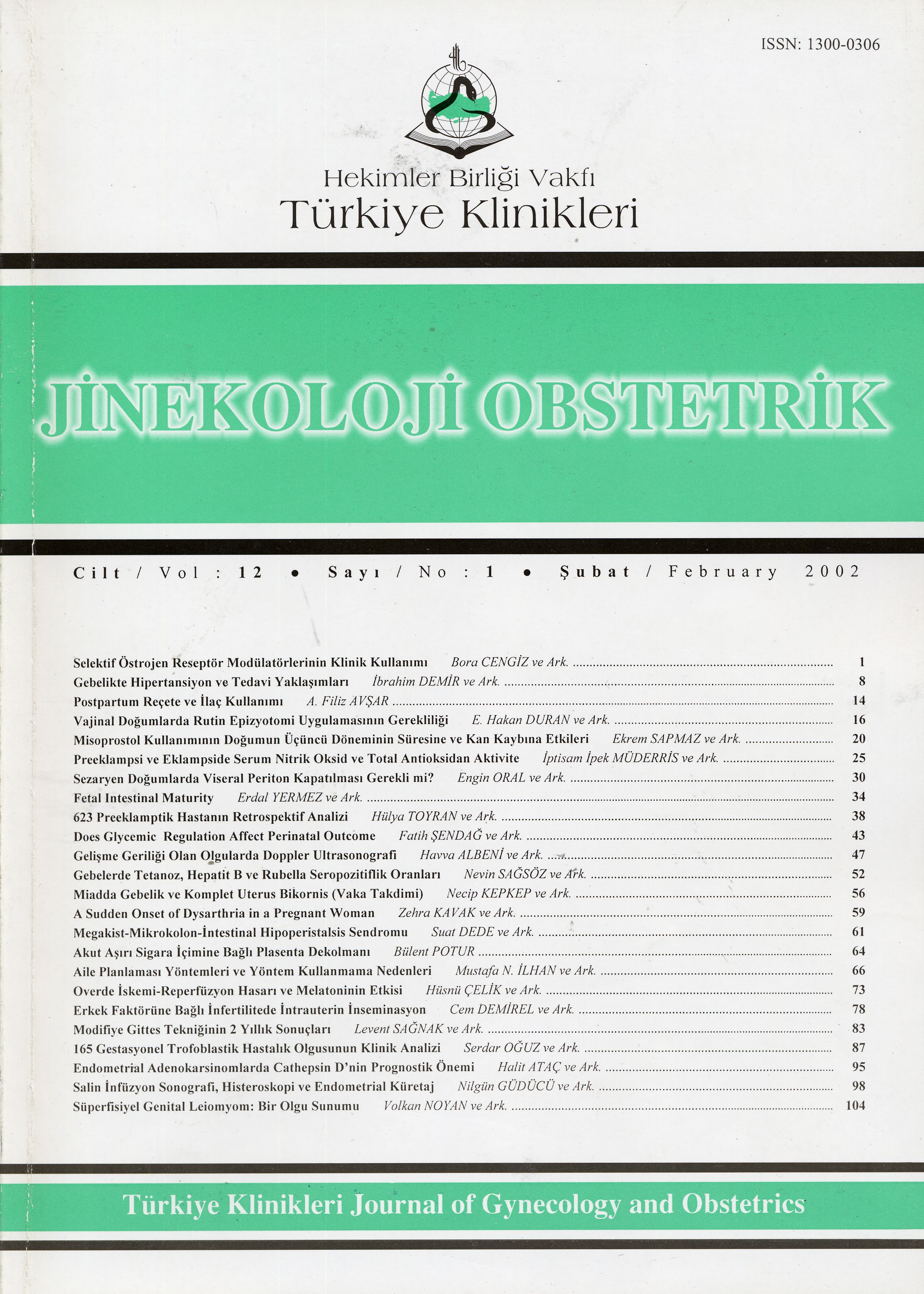Open Access
Peer Reviewed
ARTICLES
3088 Viewed909 Downloaded
Does Maternal Glycemic Regulation Affect Perinatal Outcome In Women with Gestational Diabetes Mellitus?
Gestasyonel Di̇abetes Melli̇tusu Olan Kadinlarda Maternal Gli̇semi̇k Regülasyon Peri̇natal Sonuçlari Etki̇ler Mi̇?
Turkiye Klinikleri J Gynecol Obst. 2002;12(1):43-6
Article Language: TR
Copyright Ⓒ 2025 by Türkiye Klinikleri. This is an open access article under the CC BY-NC-ND license (http://creativecommons.org/licenses/by-nc-nd/4.0/)
ÖZET
Amaç: Bu çalışmanın amacı gestasyonel diabetes mellitus ile komplike olmuş gebeliklerde maternal glisemik regülasyonun önemini ortaya koymaktır. Materyel ve Metod: Gestasyonel diabetes mellitus ile komplike olmuş 117 ardışık gebeliğin kayıtları retrospektif olarak incelendi. Gestasyonel diabetes mellitus olan hastalara diet ya da diet ile kombine insulin tedavisi uygulandı. Ortalama glukoz düzeyi tüm glukoz ölçümlerinin hospitalizasyon süresince yapılan ölçüm sayısına bölünmesi ile hesaplandı. Hastalar iki gruba ayrıldı: Grup Aya ortalama glukoz düzeyi 100 mg/dL (n=52) altında olan hastalar, grup Bye 100 mg/dL (n=65) üzerinde olan hastalar alındı.Bulgular: Sezaryen ile doğum grup Bde grup Aya göre anlamlı olarak daha yüksek saptandı (%11.5a karşılık %7.7, p=0.34). Preterm doğum grup Bde grup Aya göre anlamlı olarak daha yüksek bulundu (%26.2ye karşılık %5.8, p=0.003). Grup Bde bebeklerin %18.5i yenidoğan ünitesine yatırılırken, grup Ada bebeklerin %9.6sı yenidoğan ünitesine yatırıldı (p=0.17). Beşinci dakika düşük Apgar skoru grup Bde 6 bebekte ve grup Ada 2 bebekte saptandı. Grup Bde 4500 kg üzerinde doğum ağırlığı olan tek bir bebek bulundu.Sonuç: Kötü glisemik kontrolü olan gestasyonel diabetes mellituslu hastalarda kötü perinatal sonuçlar daha yüksek izlenmektedir.
Amaç: Bu çalışmanın amacı gestasyonel diabetes mellitus ile komplike olmuş gebeliklerde maternal glisemik regülasyonun önemini ortaya koymaktır. Materyel ve Metod: Gestasyonel diabetes mellitus ile komplike olmuş 117 ardışık gebeliğin kayıtları retrospektif olarak incelendi. Gestasyonel diabetes mellitus olan hastalara diet ya da diet ile kombine insulin tedavisi uygulandı. Ortalama glukoz düzeyi tüm glukoz ölçümlerinin hospitalizasyon süresince yapılan ölçüm sayısına bölünmesi ile hesaplandı. Hastalar iki gruba ayrıldı: Grup Aya ortalama glukoz düzeyi 100 mg/dL (n=52) altında olan hastalar, grup Bye 100 mg/dL (n=65) üzerinde olan hastalar alındı.Bulgular: Sezaryen ile doğum grup Bde grup Aya göre anlamlı olarak daha yüksek saptandı (%11.5a karşılık %7.7, p=0.34). Preterm doğum grup Bde grup Aya göre anlamlı olarak daha yüksek bulundu (%26.2ye karşılık %5.8, p=0.003). Grup Bde bebeklerin %18.5i yenidoğan ünitesine yatırılırken, grup Ada bebeklerin %9.6sı yenidoğan ünitesine yatırıldı (p=0.17). Beşinci dakika düşük Apgar skoru grup Bde 6 bebekte ve grup Ada 2 bebekte saptandı. Grup Bde 4500 kg üzerinde doğum ağırlığı olan tek bir bebek bulundu.Sonuç: Kötü glisemik kontrolü olan gestasyonel diabetes mellituslu hastalarda kötü perinatal sonuçlar daha yüksek izlenmektedir.
ANAHTAR KELİMELER: Gestasyonel diabetes mellitus, Perinatal sonuç, Glisemik kontrol
ABSTRACT
Objective: The aim of the study is to determine the significance of maternal glycemic regulation in the fetal outcomes in pregnancies complicated by gestational diabetes mellitus.Materials and Methods: The records of 117 consecutive pregnancies complicated with gestational diabetes mellitus were evaluated retrospectively. The patients with gestational diabetes mellitus were treated either with diet or diet in combination with insulin. The mean glucose level was calculated by dividing the total sum of the glucose levels by the number of measurement during the days of hospitalization. The patients were divided in two groups: In group A the mean glucose level was lower than 100 mg/dL (n=52) and in group B higher than 100 mg/dL (n=65).Results: Cesarean section was performed significantly more often in group B than the group A (53.8% versus 34.6%, p=0.03). Preterm delivery was found to be significantly higher in group B (26.2% versus 5.8%, p=0.003). A total of 18.5% of babies delivered in group B were admitted to the neonatal unit compared to 9.6% in group A (p=0.17). Low Apgar scores at 5 minutes occurred in 6 babies born in group B compared to 2 babies in group A. Only one macrosomic newborn with birthweight higher than 4500 g was found in group B.Conclusion: Adverse perinatal outcomes seems to be higher in the gestational diabetics with poor glycemic control.
Objective: The aim of the study is to determine the significance of maternal glycemic regulation in the fetal outcomes in pregnancies complicated by gestational diabetes mellitus.Materials and Methods: The records of 117 consecutive pregnancies complicated with gestational diabetes mellitus were evaluated retrospectively. The patients with gestational diabetes mellitus were treated either with diet or diet in combination with insulin. The mean glucose level was calculated by dividing the total sum of the glucose levels by the number of measurement during the days of hospitalization. The patients were divided in two groups: In group A the mean glucose level was lower than 100 mg/dL (n=52) and in group B higher than 100 mg/dL (n=65).Results: Cesarean section was performed significantly more often in group B than the group A (53.8% versus 34.6%, p=0.03). Preterm delivery was found to be significantly higher in group B (26.2% versus 5.8%, p=0.003). A total of 18.5% of babies delivered in group B were admitted to the neonatal unit compared to 9.6% in group A (p=0.17). Low Apgar scores at 5 minutes occurred in 6 babies born in group B compared to 2 babies in group A. Only one macrosomic newborn with birthweight higher than 4500 g was found in group B.Conclusion: Adverse perinatal outcomes seems to be higher in the gestational diabetics with poor glycemic control.
MENU
POPULAR ARTICLES
MOST DOWNLOADED ARTICLES





This journal is licensed under a Creative Commons Attribution-NonCommercial-NoDerivatives 4.0 International License.










